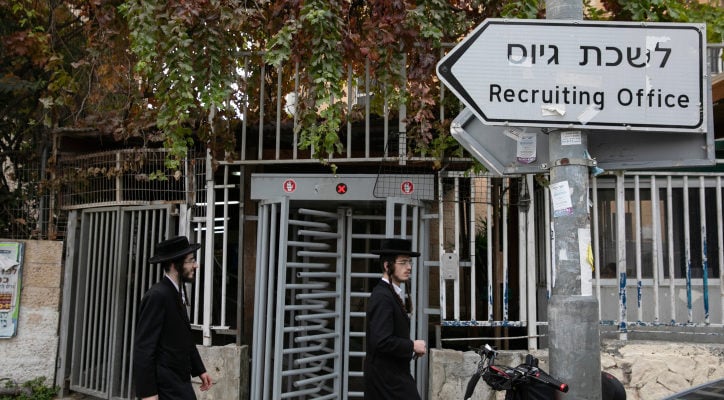The bill in its current form would lower the age of exemption from mandatory service for Haredi yeshiva students from 26 to 21.
By Troy Osher Fritzhand, JNS
The Knesset plenum is set to vote on Monday in first reading on a bill that would codify the role of the ultra-Orthodox in the Israel Defense Forces.
Israeli Defense Minister Yoav Gallant, who has expressed opposition to the bill, is expected to vote against it, according to Ynet. The “IDF needs more fighters” and the bill as is does not provide this, said Gallant according to the report.
The defense minister had said in February that any proposal for ultra-Orthodox conscription must have consensus for him to support it.
Speaking at a press conference at Israel Defense Forces headquarters in Tel Aviv, Gallant said, “I call on the prime minister to lead a joint process with all coalition factions to reach the necessary agreements on the subject of the conscription law.”
He added, “Any conscription law that is agreed upon by all the parties of the emergency government will be acceptable to me. But without the consent of all parts of the coalition, the security establishment under my authority will not submit the bill [for government approval].”
The bill coming up for a vote on Monday was proposed by Israeli Prime Minister Benjamin Netanyahu in May, and is identical to a bill developed by then-Defense Minister Benny Gantz under the previous government.
At the time, Netanyahu’s office said the bill sought “to bridge the differences and bring about a broad consensus,” as Gantz’s bill had already passed its first Knesset reading.
“The bill was prepared by the defense establishment…and submitted by then-Defense Minister Benny Gantz,” the PMO said. “The prime minister calls on all factions that supported the proposal in the previous Knesset to join the proposal,” the statement continued.
The move was reportedly meant to prevent opposition to the bill by Gantz, who at the time was a member of the temporary unity government set up in the aftermath of Hamas’s Oct. 7 massacre.
However, Gantz came out against his own bill, stating that the prevailing conditions in the country had changed dramatically since he initially tabled it.
“The State of Israel needs soldiers and not political exercises that tear the people apart in times of war,” he said following the release of Netanyahu’s bill.
“The temporary mediation law that was submitted and which the prime minister wishes to pass now was not satisfactory then, and is not relevant today in the reality after October 7,” he said
On Sunday evening, the former defense minister announced his departure from the unity government.
Speaking at a press conference in Ramat Gan, Gantz said, “It was an easy decision to enter the government, but the decision to leave was very difficult.”
“Unfortunately, Netanyahu is stopping us from reaching a true victory,” he continued. “Therefore, we are now leaving, today, the unity government. With a heavy heart, but wholeheartedly.”
The conscription bill was also shot down by the haredi parties in the previous Knesset. When it passed its first reading under the previous government, United Torah Judaism Knesset member Moshe Gafni, who is a member of the current coalition, called it “a despicable and disgraceful proposal.”
Shas chairman and Netanyahu confidante Aryeh Deri at the time called it an “offensive law whose sole purpose is to harm the members of the yeshivah and to exclude the youth from their studies.”
Deri, however, is reportedly behind the effort to push the bill now.
The haredi parties are now set to let the bill pass in first reading, but will demand changes to the draft legislation ahead of the second and third readings, according to Hebrew media reports.
The bill in its current form would lower the age of exemption from mandatory service for haredi yeshivah students from 26 to 21, in an effort to get more haredi men to enter the labor force.
It would also gradually increase haredi enlistment, setting a conscription target of 35% of male haredi students by 2036.
If the targets are not met, non-compliant yeshivahs will face large fines.
Gallant is not the only one in Netanyahu’s coalition with problems regarding the bill. Lawmakers such as Nir Barkat, Ohad Tal, Dan Illouz, Yuli Edelstein, and others have called for the bill to include provisions to boost enlistment.
Edelstein’s disapproval is notable as he heads the Foreign Affairs and Security Committee, the committee the bill will head to if passed on Monday, where it will be debated, amended and prepared for future readings. He has said it does not align with the needs of the IDF.
Protesters against the bill have been active as well in the lead up to the vote. On Monday morning, members of the Recruiting for Unity group of parents of fallen soldiers and current reservists left funeral wreaths at the homes and cars of coalition members, expressing their fears that passing the law will lead to more deaths.
“The IDF lacks 7,000 soldiers, and supporting the law endangers the lives of Israeli citizens,” the group said.
While the vote is happening, Israel’s Supreme Court, sitting as the High Court of Justice, is hearing a case in which the petitioners argue that the state must start recruiting ultra-Orthodox yeshivah students because the law exempting them from mandatory service expired last year.
The government representative has requested that the court reject the petitions and instead allow the Knesset to continue the legislative process toward a solution.





